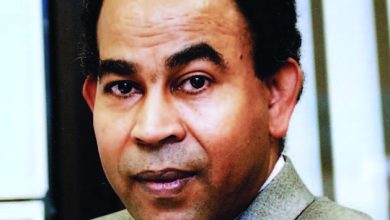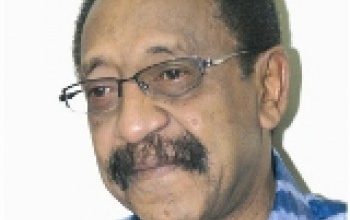Sudan and America: 60 Years of a Troubled Relationship!!

By Al-Obaid Ahmed Muraweh
With its unilateral sanctions imposed at the beginning of this year on public institutions, private companies, and individuals in Sudan, including the Sudanese defence industries system and companies affiliated with the Rapid Support Forces (RSF), and then individuals like Abdel Rahim Daglo, the second-in-command of the rebel RSF, and Professor Ali Karti, the Secretary-General of the Islamic Movement, on the pretext that these entities and individuals “obstruct the democratic transition in Sudan,” the United States of America, under successive administrations, has practically confirmed that it has failed to establish a stable relationship with Sudan, amid the alternation and contradictions of the regimes that have ruled it for over sixty years.
American interest in Sudan is not a new phenomenon. Sudan, the largest country in Africa in terms of land area, straddling the Arab and African worlds, with its strategic location and abundant resources both above and below the ground, shares many similarities with the United States. It is a nation characterised by its ethnic and cultural diversity, formed by centuries of migrations. Had its founding fathers managed its affairs differently more than sixty years ago, Sudan could have become the “United States of Africa.”
This resemblance in terms of size, diversity, and wealth may help explain some of America’s interest in Sudan. It also sheds light on the warm reception that Sudanese President Ibrahim Abboud received when he visited the United States in 1961. Abboud, who had seized power in a coup against an elected democratic government, was referred to in the documents of that visit as the “Sudanese Prime Minister.” After a successful visit, he returned with generous promises. The United States committed to paving roads connecting various parts of Sudan, including the Khartoum-Wad Medani road, which was to be dual-laned in both directions. They also pledged to construct a road alongside the Nile from Khartoum northward. Additionally, they promised to establish industrial schools in Sudan’s major cities. However, the Soviet propaganda machine and its local mouthpieces portrayed these achievements as if America was planning to build wide roads to use as runways for its aircraft in the event of an invasion of Sudan. They successfully curtailed the American assistance, which only resulted in the “Almauna (Aid) Street” in Khartoum!
Democracy returned to Sudan in 1965, a year after the “October Revolution,” but the United States did not invest much in it. However, American interest in Sudan intensified after the overthrow of that democratic experiment in a military coup led by Colonel Jaafar Nimeiri on 25 May 1969. Nimeiri’s regime initially had a leftist orientation, which was supported by the Eastern Bloc led by the Soviet Union. When the Communists attempted to consolidate their control over the government in July 1971, the United States intervened through its allies in the region, helping to thwart the coup. As a result, President Nimeiri turned to the West, and a rapprochement between the two countries began. This was manifested, in part, by the entry of Chevron into Sudan in the late 1970s for oil and gas exploration.
President Nimeiry’s regime cooperated with the United States in several areas, especially those that served its interests in the region during the Cold War days. Sudan played an influential role in supporting opponents of ruling regimes aligned with the Eastern Bloc, notably the regime of Colonel Muammar Gaddafi in Libya and the regime of Colonel Mengistu Haile Mariam in Ethiopia. Sudan also cooperated with the United States in executing special operations, such as the operation to airlift the Ethiopian Jews from Ethiopia through eastern Sudan. However, this cooperation did not shield Nimeiry when he decided to implement Islamic Sharia law in his country. Soon after, the United States turned against him, supporting the armed southern opposition led by John Garang, which had issued its founding statement more than three months before the announcement of the Sharia law’s implementation. The U.S. suspended all forms of grants and loans from international financial institutions to Sudan. It withdrew Chevron’s engineers and workers from the oil fields, sealing the wells with concrete after having drilled more than forty productive wells!
Despite the overthrow of President Nimeiry’s regime in a popular revolution, he started a special visit to the United States, followed by an interim government and then an elected democratic regime that lasted for over three years. However, the undisclosed American sanctions on Sudan were not lifted, and the cooling of relations between the two countries persisted. America’s task was to have the Prime Minister at the time, Sadiq al-Mahdi, repeal Islamic Sharia laws and comply with the terms of the People’s Movement to bring peace by making Sudan a secular country and reducing Libyan influence in Sudan. America disregarded the fate of nascent democracy in the country, which was reeling under the blows of rebellion!
The situation did not change much regarding the general direction when a military coup led by then-Colonel Omar al-Bashir overthrew Sadiq al-Mahdi’s government. Instead, the United States began to tighten the noose on the new regime after it became clear that it had a close connection with the National Islamic Front and its leader, Dr. Hassan al-Turabi. The United States took a series of political harassment steps against the Salvation regime after accusing Sudan of supporting terrorism through Sheikh Omar Abdel-Rahman, who left his country for Sudan and then departed for the United States. Gradual sanctions were imposed on Sudan in 1993. They continued to tighten whenever an opportunity arose with new pretexts, such as the presence of Osama bin Laden in Sudan, the alleged involvement in the assassination attempt on President Hosni Mubarak in 1995, the bombings of the U.S. embassies in Kenya and Tanzania in 1998, the World Trade Centre bombings in New York in 2001, and the USS Cole bombing off the coast of Yemen in 2002. Without any credible evidence, the war in Darfur in 2003 led the United States to consider the Sudanese government involved in these events. Each time, America tightened its grip on the Sudanese regime, using congressional powers sometimes and executive powers of presidents at other times. Throughout all of this, political, media, and occasionally military support remained connected to the opposition to topple the Salvation regime.
After thirty years of a turbulent relationship with the Salvation regime, it was more like a game of cat and mouse where the United States successfully managed to bring it down. Many Sudanese believed that once the regime was gone, America would remove their country’s name from the “terrorism-supporting” list, which it had placed and defined the criteria for. They thought America would compensate the Sudanese for years of economic sanctions imposed on their country under false pretexts. Sudan’s banking system would be allowed to integrate into the global financial system, Boeing would be instructed to arrange a strategic partnership with Sudanair after years of embargo preventing it from obtaining spare parts, and the locomotives would regain their glory after the embargo had crippled them too. Transport would flourish, the banking sector would thrive, and the economy would grow. Many Sudanese anticipated that America would pressure and entice armed opposition groups to join the peace and reconstruction efforts quickly. Sudan’s youth looked forward to a democratic system where power was elected and represented the free will of citizens, with America seen as their ally in achieving that.
However, none of this happened. All these dreams evaporated, and some turned into nightmares. America seemed more interested in trivial matters and frivolities, with its priorities in Sudan being completely different. It insisted that Sudan’s removal from its terrorism-supporting list was contingent on normalising relations with Israel. Furthermore, it demanded that the Sudanese government pay a “ransom” from the sweat of its people to have its charges dropped for a crime it did not commit. America was interested in legalising alcohol, gambling, and usury and promoting LGBTQ+ rights. It also wanted to revise the education curriculum and personal status laws to “eradicate extremism and terrorism.” For these reasons, it chose who it believed were the most capable of executing its project in Sudan and considered them a “civil authority.” After all, it was America that set the standards for everything!



